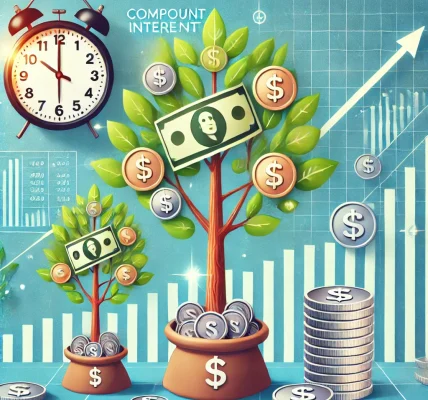In the world of investing, there is one fundamental principle that has stood the test of time—compounding. Compounding is the process by which investments generate earnings, which are then reinvested to generate even more earnings over time. This powerful financial concept has the potential to turn small, consistent investments into significant wealth over the long term.
In this blog, we will explore the mechanics of compounding, its benefits, strategies to maximize its impact, and the common pitfalls investors should avoid.
Understanding Compounding: The Basics
Compounding works by reinvesting the returns generated by an investment so that future returns are earned on both the initial principal and previously accumulated earnings. This cycle continues over time, creating exponential growth in investment value.
The fundamental formula for compound interest is:
A = P (1 + r/n)^(nt)
Where:
- A = Future value of the investment/loan
- P = Initial principal amount
- r = Annual interest rate (in decimal form)
- n = Number of times interest is compounded per year
- t = Number of years the money is invested for
For example, if you invest $1,000 at an annual interest rate of 8%, compounded annually, your investment would grow as follows:
- After 1 year: $1,080
- After 5 years: $1,469
- After 10 years: $2,159
- After 20 years: $4,661
- After 30 years: $10,062
As you can see, the longer the investment duration, the greater the impact of compounding.
Benefits of Compounding
1. Wealth Accumulation Over Time
The most significant benefit of compounding is the ability to grow wealth significantly over time. Even small investments can turn into large sums when given enough time to grow.
2. Passive Growth Without Additional Effort
Once your investment starts compounding, you do not need to make additional deposits to see exponential growth. Your money starts working for you.
3. Encourages Long-Term Investing
Compounding rewards patience. The earlier you start investing, the more time your investments have to compound and grow.
4. Hedge Against Inflation
Inflation reduces the purchasing power of money over time. Investing in assets that compound at a higher rate than inflation helps protect and increase wealth.
5. Retirement Security
Compounding plays a crucial role in retirement planning. Regular investments in a retirement fund over decades can result in a financially secure retirement.
Strategies to Maximize the Power of Compounding
1. Start Investing Early
The earlier you start investing, the more time your money has to grow. Even small contributions can result in substantial wealth when compounded over decades.
2. Make Consistent Contributions
Regular investments, such as through systematic investment plans (SIPs) or dollar-cost averaging, ensure that your money continues to grow steadily.
3. Reinvest Your Earnings
Instead of withdrawing returns, reinvesting them allows you to benefit from compounding. For example, dividends from stocks can be reinvested to purchase more shares.
4. Choose High-Quality, Long-Term Investments
Investing in assets with strong growth potential, such as equity funds, mutual funds, and index funds, can maximize compounding benefits.
5. Minimize Fees and Taxes
High management fees and taxes can eat into your returns. Opt for tax-efficient investments and low-cost funds to maximize compounding.
6. Be Patient and Stay Invested
The key to compounding success is time. Avoid frequent withdrawals and stay invested for the long term.
Common Pitfalls to Avoid
1. Delaying Investments
The biggest mistake investors make is waiting too long to start investing. The earlier you begin, the more you benefit from compounding.
2. Not Reinvesting Returns
Spending your earnings instead of reinvesting them diminishes the power of compounding.
3. Frequent Withdrawals
Withdrawing funds disrupts the compounding process and reduces potential gains.
4. Investing in Low-Growth Assets
Fixed deposits and low-interest savings accounts may not provide sufficient growth to outpace inflation.
5. Ignoring Inflation
Investments that do not outpace inflation result in a loss of purchasing power over time.
Conclusion
Compounding is a powerful force that can help investors build wealth over time with minimal effort. By starting early, reinvesting earnings, and remaining patient, even small investments can grow into substantial sums. However, it is essential to avoid common pitfalls such as delaying investments, frequent withdrawals, and high-cost investments.
For anyone looking to secure their financial future, harnessing the power of compounding is a must. Start investing today, remain consistent, and let time work in your favor.
Disclaimer:
This blog is for informational purposes only and does not constitute financial advice. Always consult with a professional financial advisor before making investment decisions.




